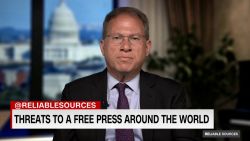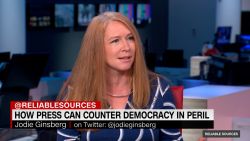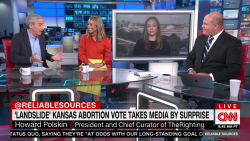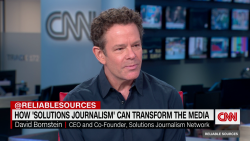BuzzFeed CEO Jonah Peretti wants all of us to “fight” for a better internet.
“The internet is at a crossroads,” he wrote in a strategy memo to staff recently. “In one direction, there is a flaming dumpster fire, pushing people apart. In the other, the internet is a source of joy and truth, connecting people together.”
So how are sites like BuzzFeed trying to put out the fire? That’s what Peretti discussed on this week’s “Reliable Sources” podcast.
“There’s a lot more focus” on the ugly underbelly right now, Peretti said, partly thanks to reporters — including those at BuzzFeed — who have raised awareness about hoaxes, scams, privacy invasions and other maladies of the internet.
“But I think it’s important to remember what is good about the Internet,” he said. “And it’s important to fight for that — and to realize that we have a choice in the matter and we can actually work together to build a better internet.”
That’s what he encouraged people to do during a keynote address at SXSW on Friday. The Austin Chronicle’s headline afterward: “Peretti Wants to Save the Internet From Itself.”
Peretti told CNN Business that big tech platforms such as Facebook have to play a pivotal role in extinguishing the aforementioned “dumpster fire.”
But newsrooms have a role to play too, he said: “We want to do great reporting about all the problems that are on the internet and raise awareness and make sure the public knows about them.”
Then he turned to the “joy” part: “We also want to make great content on the internet in a way that is sustainable as a business.”
During the interview, Peretti repeatedly returned to the word “sustainable.” Digital media brands have attracted huge audiences but have struggled to make equally huge profits. Earlier this year BuzzFeed laid off 15% of its staff, and other startups have made similar cutbacks.
Peretti called it “unfortunate” but said the cuts were part of an industry-wide shift from growth to sustainability.
“The focus now is not, ‘Can you outrun everyone?’ It’s, ‘Can you outlast everyone?’ And the digital media companies are starting to be run like real businesses,” he said.
BuzzFeed’s growth over the years has been driven by social distribution — tapping into the power of sites such as Facebook and Twitter.
Peretti is still more bullish about the tech giants than many other media bosses. He said that of BuzzFeed’s roughly $300 million in overall revenue last year, $84 million came from “the four big platforms,” naming Facebook, Google, Amazon and Netflix.
“Five years ago, that was only $7 million in revenue,” he said, so “we’re excited about seeing how much growth in revenue we’re seeing.”
For more than a year, BuzzFeed has been dogged by speculation that the company might try to spin off or sell the news division.
The Financial Times reported in early 2018 that BuzzFeed News editor Ben Smith “had discussions” with Laurene Powell Jobs’ company, the Emerson Collective, which has been investing in numerous media companies.
To date, however, nothing has come of the talks.
When asked about this on the podcast, Peretti said “news is expensive” but “we’re 100% committed” to it.
He said flatly, “I don’t want to sell BuzzFeed News.”






















